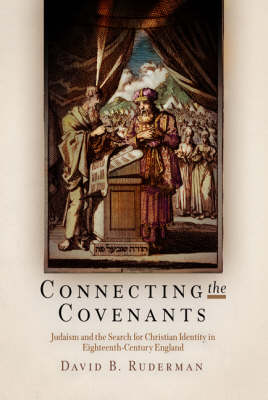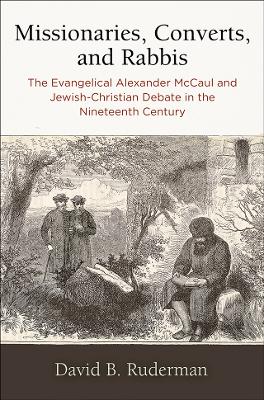Jewish Culture and Contexts
2 total works
The first few decades of the eighteenth century witnessed an important moment in Jewish-Christian relations, as influential Christian scholars increasingly looked to Jewish texts to reveal the truths of their own faith. To what extent could postbiblical writings help them better understand the New Testament? And who would best be able to explicate these connections?
Connecting the Covenants focuses on two separate but entwined stories, the first centering around the colorful character of Moses Marcus. The English-born son of wealthy parents and the grandson of the famous autobiographical author Glikl of Hameln, Marcus was a prominent Jew educated in the Ashkenazic yeshivah at Hamburg. On New Year's Day, 1723, Marcus was baptized as a Christian, later publishing a justification of his conversion and a vindication of his newly discovered faith in a small book in London. A trophy convert, he was promoted by figures at the highest levels of the Anglican Church as a cultural mediator between Judaism and Christianity. His modest successes in the world of the elite clerical establishment were followed, however, by conspicuous failures, both intellectual and material.
The second story that David Ruderman tells emerges against the background of Marcus's professional decline. In the end, the prize convert proved to be a theologian of limited ability, far outstripped in sophistication and openness to rabbinic learning by a circle of Enlightenment Protestant scholars. It was not the Jew who had abjured Judaism who was willing or able to apply the Mishnah and Talmud to Christian exegesis, but figures such as William Whiston, Anthony Collins, William Wotton, and the Dutch scholar William Surenhusius who seized upon the ways to connect the covenants.
An examination of the life and work of Alexander McCaul and his impact on Jewish-Christian relations
In Missionaries, Converts, and Rabbis, David B. Ruderman considers the life and works of prominent evangelical missionary Alexander McCaul (1799-1863), who was sent to Warsaw by the London Society for the Promotion of Christianity Amongst the Jews. He and his family resided there for nearly a decade, which afforded him the opportunity to become a scholar of Hebrew and rabbinic texts. Returning to England, he quickly rose up through the ranks of missionaries to become a leading figure and educator in the organization and eventually a professor of post-biblical studies at Kings College, London. In 1837, McCaul published The Old Paths, a powerful critique of rabbinic Judaism that, once translated into Hebrew and other languages, provoked controversy among Jews and Christians alike.
Ruderman first examines McCaul in his complexity as a Hebraist affectionately supportive of Jews while opposing the rabbis. He then focuses his attention on a larger network of his associates, both allies and foes, who interacted with him and his ideas: two converts who came under his influence but eventually broke from him; two evangelical colleagues who challenged his aggressive proselytizing among the Jews; and, lastly, three Jewish thinkers—two well-known scholars from Eastern Europe and a rabbi from Syria—who refuted his charges against the rabbis and constructed their own justifications for Judaism in the mid-nineteenth century.
Missionaries, Converts, and Rabbis reconstructs a broad transnational conversation between Christians, Jews, and those in between, opening a new vista for understanding Jewish and Christian thought and the entanglements between the two faith communities that persist in the modern era. Extending the geographical and chronological reach of his previous books, Ruderman continues his exploration of the impact of Jewish-Christian relations on Jewish self-reflection and the phenomenon of mingled identities in early modern and modern Europe.

